#right of suffrage
Text

836 notes
·
View notes
Text
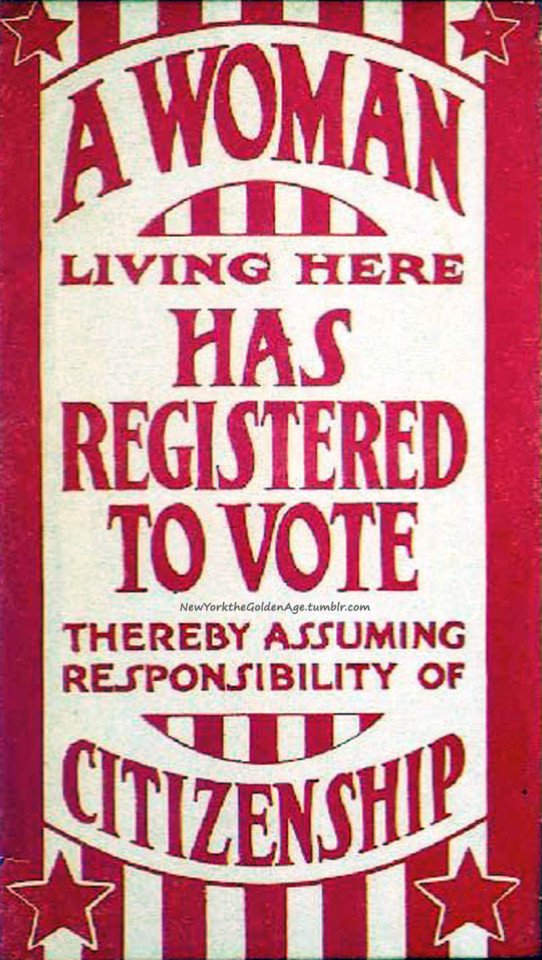
A window card from 1920, proclaiming that a newly-enfranchised woman had registered to vote.
Photo: NYC Municipal Archives
#vintage New York#1920s#19th Amendment#women's suffrage#female suffrage#poster#right to vote#voter registration#citizenship
967 notes
·
View notes
Text

Remembering the women that fought for our right to vote
149 notes
·
View notes
Text

Suffragist poster detail, 1913. United Kingdom.
Harvard Library
#political posters#women's suffrage#uk#big cat#tables turned#dangerous animals#women's rights#nemfrog#posters#1913#1910s#bad cat
290 notes
·
View notes
Text

USIA poster, 7/30/1953, NARA ID 5730043.
VOTE ON TUESDAY!
The 2022 midterm elections will be held on Tuesday, November 8, and there's still time to ensure you're registered to vote. The National Archives supports Executive Order 14019, which promotes voter registration, participation, and access to voting. See Vote.gov for more information.
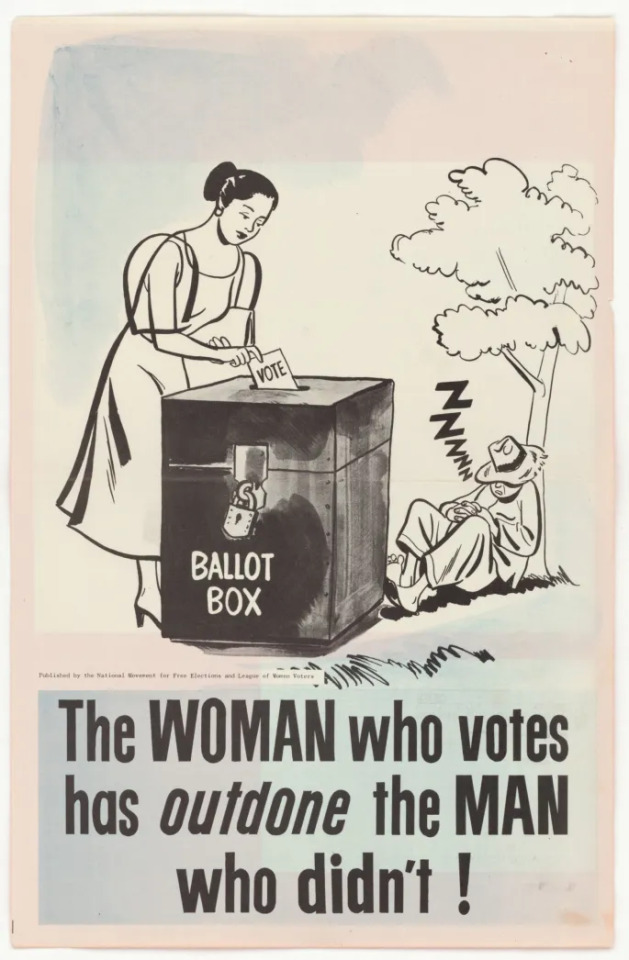
USIA poster 10/8/1951, NARA ID 5730163.
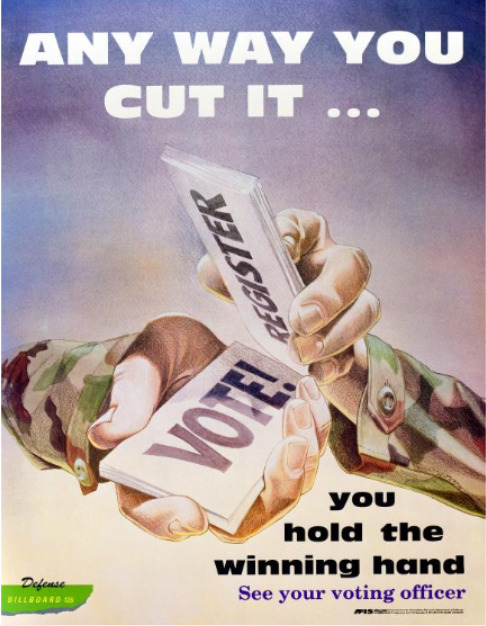
American Forces Information Service poster, 1/1/2000, NARA ID 10488372.
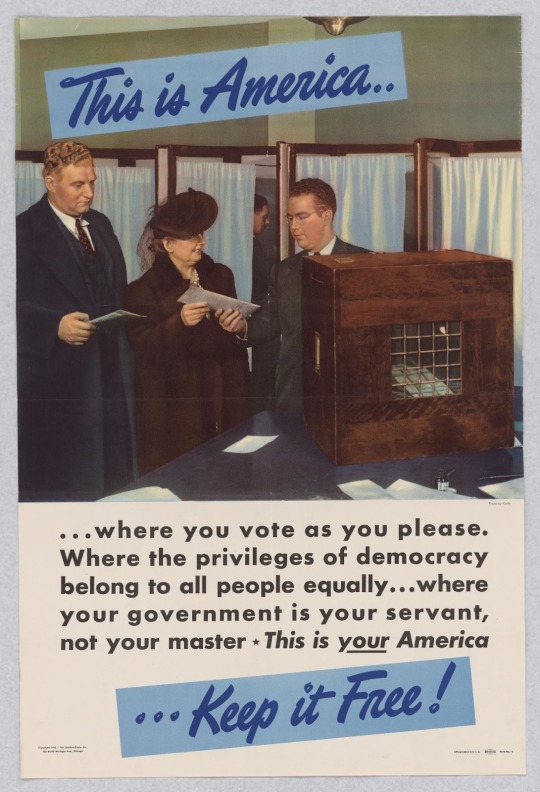
Office of War Information, WW2 poster, NARA ID 515775.

More online:
Civics for All of US the National Archives new education initiative promotes civic literacy and engagement.
Voting Rights Special Topics page.
Presidential Elections & Inaugurations Records in the National Archives and Presidential Libraries document elections and inaugurations through history.
Black Americans and the Vote This research portal highlights National Archives holdings that relate to the long struggle for equality in voting rights.
Women's Rights: Suffrage Discover an array of records related to the long quest for women to gain the vote as well as education resources, articles, and blog posts.
Online exhibit: Records of Rights presents records in the National Archives that document the ongoing struggle of Americans to define, attain, and protect their rights
Online exhibit: Rightfully Hers: American Women and the Vote highlights the struggle of diverse activists throughout U.S. history to secure voting rights for all American women.
#vote#gotv#elections#election history#womens suffrage#rightfullyhers#civil rights#nationalvoterregistration#election day#2022 midterms#us elections#patriotism#patriotic
2K notes
·
View notes
Text
Incomplete vs. overshoot
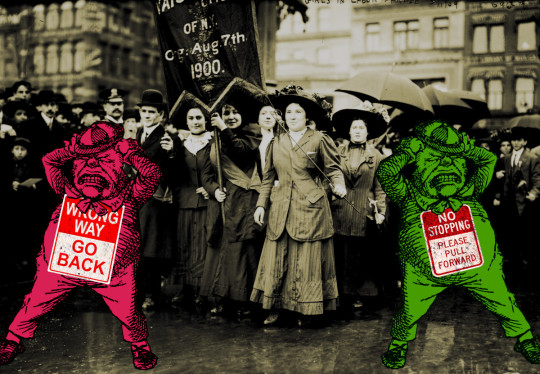
I'm on tour with my new novel The Bezzle! Catch me TONIGHT in Seattle (Feb 26) with Neal Stephenson, then Portland, Phoenix and more!

You know the "horseshoe theory," right? "The far-left and the far-right, rather than being at opposite and opposing ends of a linear continuum of the political spectrum, closely resemble each other, analogous to the way that the opposite ends of a horseshoe are close together":
https://en.wikipedia.org/wiki/Horseshoe_theory
It's a theory that only makes sense if you don't know much about the right and the left and what each side wants out of politics.
Take women's suffrage. The early suffragists ("suffragettes" in the UK) were mostly interested in votes for affluent, white women – not women as a body. Today's left criticizes the suffrage movement on the basis that they didn't go far enough:
https://www.npr.org/2011/03/25/134849480/the-root-how-racism-tainted-womens-suffrage
Contrast that with Christian Dominionists – the cranks who think that embryos are people (though presumably not for the purpose of calculating a state's electoral college vote? Though it would be cool if presidential elections turned on which side of a state line a fertility clinic's chest-freezer rested on):
https://www.wnycstudios.org/podcasts/otm/segments/how-alabama-ivf-ruling-was-influenced-christian-nationalism-on-the-media?tab=summary
These people are part of a far-right coalition that wants to abolish votes for women. As billionaire far-right bagman Peter Thiel wrote that he thought it was a mistake to let women vote at all:
https://www.cato-unbound.org/2009/04/13/peter-thiel/education-libertarian/
Superficially, there's some horseshoe theory action going on here. The left thinks the suffragists were wrong. The right thinks they were wrong, too. Therefore, the left and the right agree!
Well, they agree that the suffragists were wrong, but for opposite reasons – and far, far more importantly, they totally disagree about what they want. The right wants a world where no women can vote. The left wants a world where all women can vote. The idea that the right and the left agree on women's suffrage is, as the physicists say, "not even wrong."
It's the kind of wrong that can only be captured by citing scripture, specifically, A Fish Called Wanda, 6E, 79: "The central message of Buddhism is not 'Every man for himself.' And the London Underground is not a political movement. Those are all mistakes, Otto. I looked them up."
Or take the New Deal. While the New Deal set its sites on liberating workers from precarity, abuse and corruption, the Dealers – like the suffragists – had huge gaps in their program, omitting people of color, indigenous people, women, queer people, etc. There are lots of leftists who criticize the New Deal on this basis: it didn't go far enough:
https://livingnewdeal.org/new-deal-and-race/
But for the past 40 years, America has seen a sustained, vicious assault on New Deal programs, from Social Security to Medicare to food stamps to labor rights to national parks, funded by billionaires who want to bring back the Gilded Age and turn us all into forelock-tugging plebs:
https://pluralistic.net/2022/11/06/the-end-of-the-road-to-serfdom/
If you only view politics as a game of elementary school cliques, you might say that the left and the right are meeting again. The left says Roosevelt got it wrong with the New Deal (because he left out so many people). The right says FDR was wrong for doing the New Deal in the first place. Therefore, the left and the right agree, right?
Obviously wrong. Obviously. Again, the important thing is why the left and the right think the New Deal deserves criticism. The important thing is what the left and the right want. The left wants universal liberation. The right wants us all in economic chains. They do not agree.
It's not always just politics, either. Take the old, good internet. That was an internet defined by technological self-determination, a wild and wooly internet where there were few gatekeepers, where disfavored groups could find each other and make common cause, where users who were threatened by the greed of the shareholders behind big services could install blockers, mods, alternative clients and other "adversarial interoperability" tools that seized the means of computation.
Today's enshitternet – "five giant websites, filled with screenshots of the other four" (h/t Tom Eastman) – is orders of magnitude more populous than that old, good internet. The enshitternet has billions of users, and they are legally – and technologically – prevented from taking any self-help measures when the owners of services change them to shift value from users to themselves:
https://pluralistic.net/2023/02/19/twiddler/
The anti-enshittification movement rightly criticizes the old, good internet because it wasn't inclusive enough. It was a system almost exclusively hospitable to affluent, privileged people – the people who least needed the liberatory power of technology.
Likewise pro-enshittification monopolists – billionaires and their useful idiots – deplore the old, good internet because it gave its users too much power. For them, ad-blocking, alternative clients, mods, reverse-engineering and so on were all bugs, not features. For them, the enshitternet is great because businesses can literally criminalize taking action to protect yourself from their predatory impulses:
https://pluralistic.net/2022/10/20/benevolent-dictators/#felony-contempt-of-business-model
Superficially, it seems like the pro- and anti-enshittification forces agree – they both agree that the old, good internet was a mistake. But the difference that matters here is that the pro-enshittification side wants everyone mired in the enshitternet forever, living with what Jay Freeman calls "Felony contempt of business-model." By contrast, the disenshittification side wants a new, good internet that gives every user – not just a handful of techies – the power to decide how the digital systems they work use, and to be able to alter or reconfigure them to suit their own needs.
The horsehoe theory only makes sense if you don't take into account the beliefs and goals of each side. Politics aren't just a matter of who you agree with on a given issue – the real issue is what you're trying to accomplish.

If you'd like an essay-formatted version of this post to read or share, here's a link to it on pluralistic.net, my surveillance-free, ad-free, tracker-free blog:
https://pluralistic.net/2024/02/26/horsehoe-crab/#substantive-disagreement
#pluralistic#politics#suffrage#womens rights#new deal#civil rights#race#enshitternet#new good internet#old good internet
122 notes
·
View notes
Text
There's a discourse on Twitter right now arguing whether or not we should repeal women's suffrage in America.
So.
Yeah.
I mean to be totally fair, half of American women seem to be championing for the loss of their rights as well as the rights of their daughters and then their granddaughters but whatever right, this might as well happen.
153 notes
·
View notes
Text
"You have granted that woman may be hung," said Wendell Phillips to his fellowmen, and "therefore you must grant that woman may vote." It was as simple as that. Either women were the peers and equals of men, and in that case should enjoy all civil and political rights equally with them, or women were (as men repeatedly maintained) an inferior caste; and in that case, any woman tried by a jury of men was automatically deprived of the right to trial by a jury of her peers. Feminists argued that men simply could not have it both ways.
For the men the choice was no choice at all, for to concede either point was to lose ground and that would never do. The inconsistency of their position was rather embarrassing, but certainly not unbearably so considering what there was to lose to those implacable women so relentlessly consistent in their demands. The New York State Woman's Rights Committee laid out the agenda at the Tenth National Woman's Rights Convention in 1860: "We now demand the ballot, trial by jury of our peers, and an equal right to the joint earnings of the marriage copartnership. And, until the Constitution be so changed as to give us a voice in the government, we demand that man shall make all his laws on property, marriage, and divorce, to bear equally on man and woman." "A citizen can not be said to have a right to life," the feminists argued, "who may be deprived of it for the violation of laws to which she has never consented—who is denied the right of trial by a jury of her peers—who has no voice in the election of judges who are to decide her fate."
As things were, women could not get simple justice. "It is not to be denied," Elizabeth Cady Stanton argued to the New York legislature in 1854, "that the interests of man and woman in the present undeveloped state of the race, and under the existing social arrangements, are and must be antagonistic. The nobleman can not make just laws for the peasant; the slaveholder for the slave; neither can man make and execute just laws for woman, because in each case, the one in power fails to apply the immutable principles of right to any grade but his own." In the courts of law in particular, how could a woman receive just treatment from "men who, by their own admis-sion, are so coarse that women could not meet them even at the polls without contamination?" Feminists demanded "in criminal cases that most sacred of all rights, trial by jury of our own peers. The establishment of trial by jury is of so early a date," Cady Stanton explained with that reasonableness so maddening to her opponents, "that its beginning is lost in antiquity; but the right of trial by a jury of one's own peers is a great progressive step of advanced civilization... Hence, all along the pages of history, we find the king, the noble, the peasant, the cardinal, the priest, the layman, each in turn protesting against the authority of the tribunal before which they were summoned to appear. Charles the First refused to recognize the competency of the tribunal which condemned him: For how, said he, can subjects judge a king? The stern descendants of our Pilgrim Fathers refused to answer for their crimes before an English Parliament. For how, they said, can a king judge rebels? And shall woman here consent to be tried by her liege lord, who has dubbed himself law-maker, judge, juror, and sheriff too?—whose power, though sanctioned by Church and State, has no foundation in justice and equity, and is a bold assumption of our inalienable rights."
-Ann Jones, Women Who Kill
193 notes
·
View notes
Text
Yesterday marked the death of Sylvia Pankhurst - one of the finest revolutionary communists to have ever graced Britain's shores. We have rarely seen such fighters on this earth.
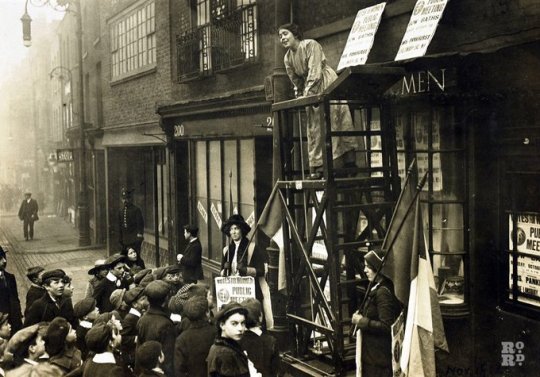
Sylvia was the most tortured suffragette, targetted for her insistence on including working class women within the demands of women's suffrage (much to the disdain of her mother and sister). She did not balk against repeated forced feeding, hunger striking and sleep striking.
She was one of a handful of communists in Britain who opposed the first world war. Her criticism of the war was ceaseless. Practically isolated, she organised relief for working class people in London with cost-price restaurants, free child care for mothers, and more.
She broke with the Labour Party over this, and never returned despite the enormous pressure put upon her by the British labour movement and, later, the Third Internationale. Her arguments with Lenin remain a key debate in communist and British politics.
Pankhurst stood resolutely with the Bolshevik revolution at its outbreak, and was pivotal in organising the "Hands Off Russia" campaign in Britain - which culminated in dock workers across the country refusing to load any munitions to ships.
Pankhurst was an outspoken opponent of racism. Her newspaper - then the Worker's Dreadnought - was the first newspaper in Britain to hire black journalists. When articles written by the Jamaican journalist, Claude McKay, were viewed as seditious, she went to jail for him.
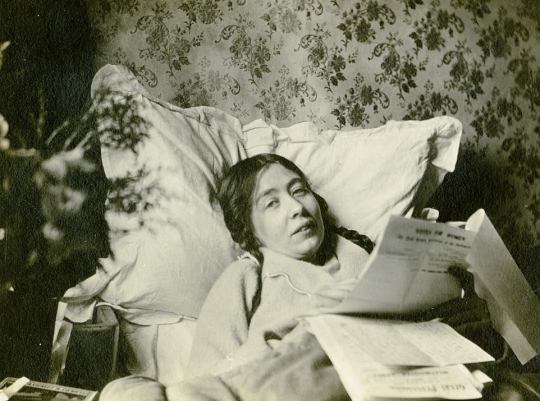
Her support for Irish independence never wavered. She supported Larkin, the Irish Transport and General Workers' Union and United Builders' Labourers Union during the Dublin lock-outs. She stood by the Irish Citizen Army during the Easter Rising.
She was one of the first in Britain to recognise the dangers of fascism, her warnings and agitation beginning as early as 1920. Through this struggle, she became deeply involved in Ethiopian national liberation, where she spent the last years of her life.
All of this is just the tip of the iceberg of the contributions Sylvia made in her life. She did all of this at great cost to herself, enduring her mother and sister denouncing her in the press repeatedly, endless slander, rejection by the mainstream communist movement and worse.

Sylvia also belongs to the great pantheon of disabled revolutionaries, being diagnosed with endometriosis whilst in prison. This, along with the damage done to her organs by forced feeding, left her with often crippling stomach problems.
"I am going to fight capitalism even if it kills me. It is wrong that people like you should be comfortable and well fed while all around you people are starving." She fought until she died, but capitalism didn't kill her. At aged 78, Sylvia passed on.
She was given a state funeral in Ethiopia, and remains the only foreigner buried in the front of Holy Trinity Cathedral. An Ethiopian migrant, cited anonymously in Rachel Holmes' biography of Pankhurst, summed up what she meant to him thus:
"After God, Sylvia Pankhurst".

To learn more about Sylvia, we highly recommend Rachel Holmes' biography, "Sylvia Pankhurst: Natural Born Rebel".
#sylvia pankhurst#communism#politics#marxism#philosophy#communist#anti imperialism#history#leftism#world history#working class#feminism#womens rights#smash the patriarchy#suffragette#suffragists#women's suffrage
94 notes
·
View notes
Text
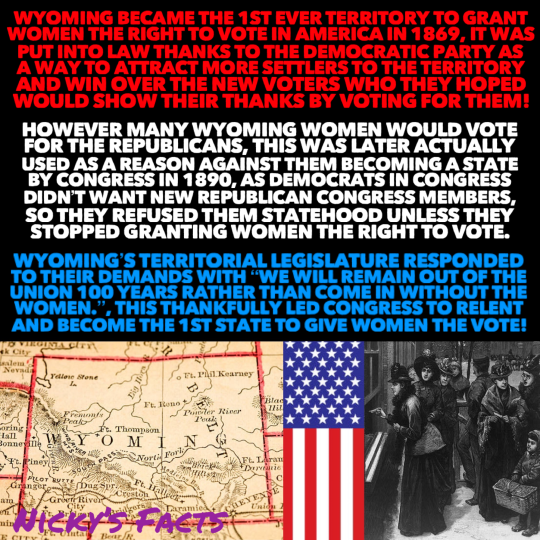
Happy Women’s Equality Day!🚺🗳️🚺
🇺🇸
The Vote is one of the most powerful right we have, never take it for granted or let your vote be used against your own or other sisters interests!
🇺🇸
#history#women’s equality day#wyoming#united states#vote#womens history#american west#democracy#politics#congress#american history#feminism#womens suffrage#voting rights#womens equality#political parties#usa#womens rights#american politics#wild west#feminist#late 1800s#women empowerment#statehood#nickys facts
106 notes
·
View notes
Text
going insane about a crack theory that I shared with yesterday @lordystrange
I thought that it was very very silly because idk I might listen to music while imagining this theory playing out... BUT NOW IT MIGHT ACTUALLY HAPPEN WHAT THE FUCK? AM I A PSYCHIC? DO I NEED TO FIND OUT MORE STUFF FOR YOU GUYS WITH THIS NEW FOUND ABILITY?
(I might share with the class (you guys) soon but I just have to figure out how to write it down in a way that is comprehensible)
#it's a st theory obviously#and it has to do with Mike Whreler's suffrage#that is the WRONG word#it has to do with the SUFFERING of Mike Wheeler#which we all want 😈#it does NOT have to do with Mike Wheeler's right to vote#byler#mike wheeler#stranger things#will byers#byler nation#st theory#stranger things theory#s5 speculation#st5 speculation#st5 predictions
33 notes
·
View notes
Text
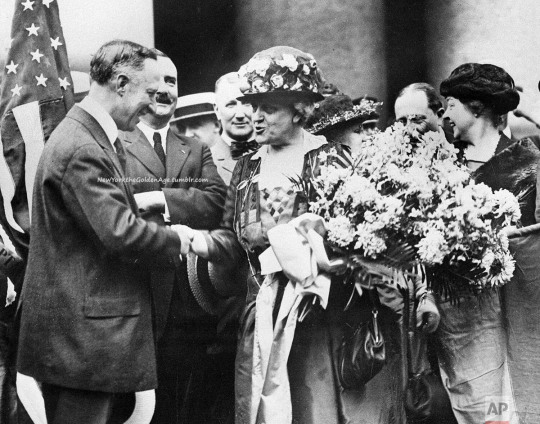
Former NY Governor Alfred E. Smith welcomes Carrie Chapman Catt, women's suffrage leader, on her triumphal return from Tennessee, August 27, 1920. Tennessee was the last state to ratify the 19th Amendment, giving women the right to vote. Miss Catt carries a bouquet of blue and yellow flowers, colors of the National American Woman's Suffrage Association.
Photo: Associated Press
#vintage New York#1920s#Carrie Chapman Catt#women's suffrage#19th Amendment#suffrage#suffragist#August 27#27 August#Al Smith#27 Aug.#Aug. 27#triumph#Constitutional amendment#right to vote
119 notes
·
View notes
Text
People tried to force-feed sufragettes...by the vagina...? What? (CW : torture, rape, violence against women, TW food, ED)

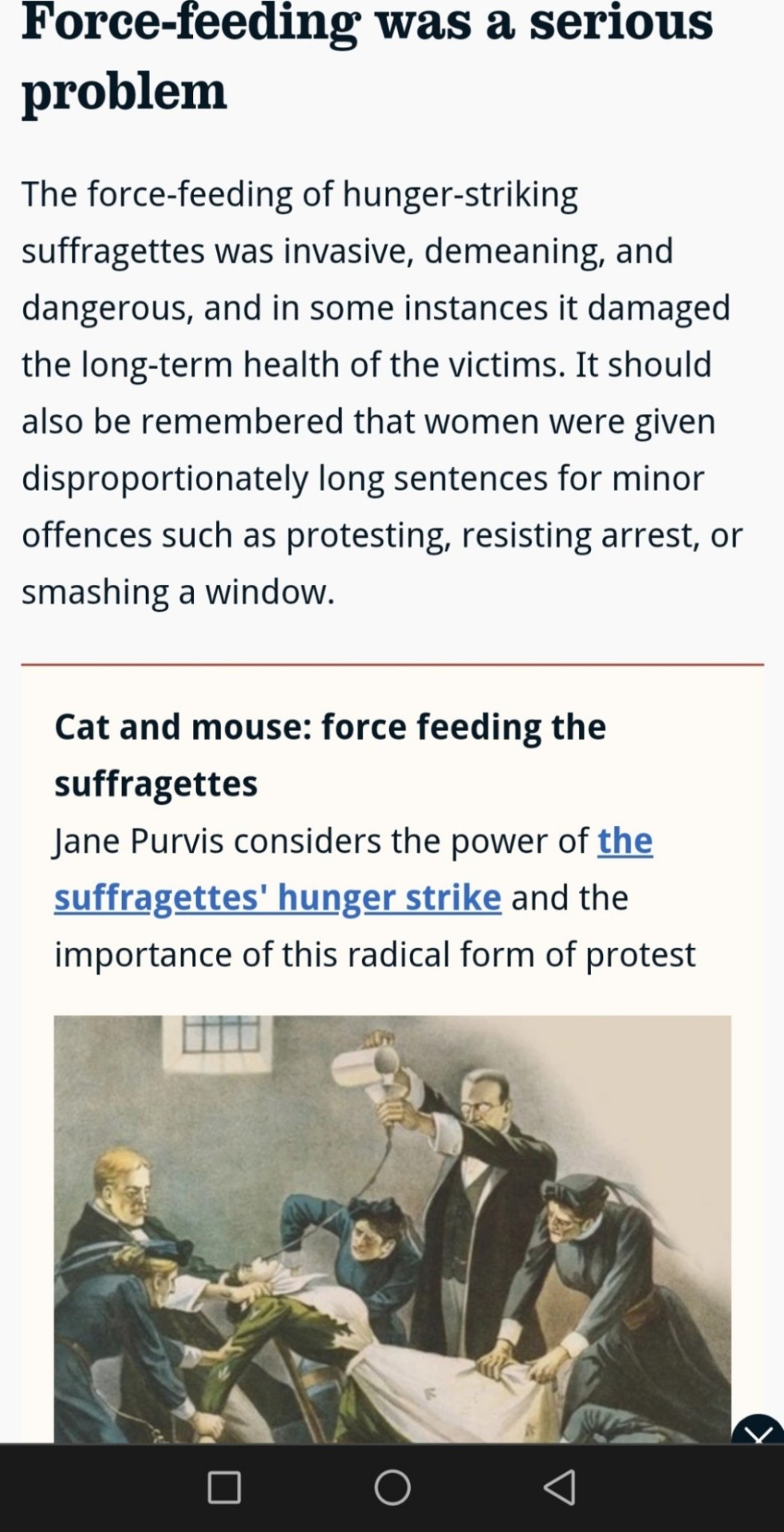


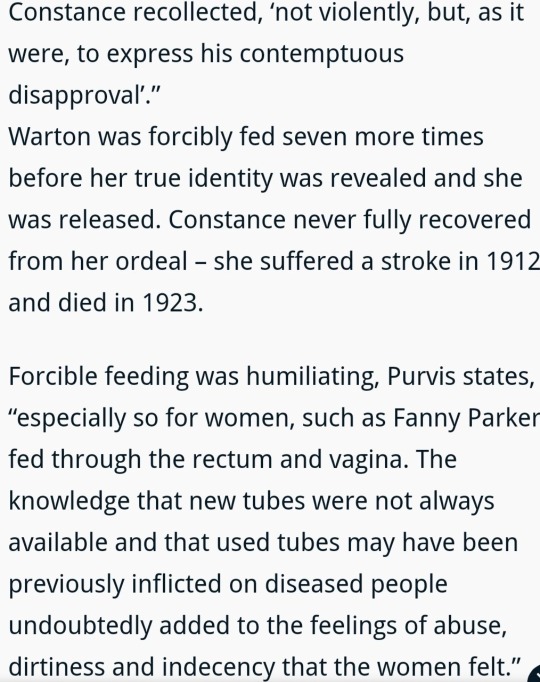

#tw food#cw torture#suffragette#women's suffrage#suffragism#misogyny#crimes against women#systemic violence#herstory#women's right#women's history#male violence#violence against women#radblr#feminism#tw rap3#tw rape#radical feminism#feminism history#smash the patriarchy
28 notes
·
View notes
Text

Ralph Barton, Making the Polls Attractive to the Anti-Suffragists, Puck, 30 February 1915.
Puck was the first successful humor magazine in the United States of colorful cartoons, caricatures and political satire of the issues of the day. It was founded in 1876 as a German-language publication by Joseph Keppler, an Austrian immigrant cartoonist.[1] Puck's first English-language edition was published in 1877, covering issues like New York City's Tammany Hall, presidential politics, and social issues of the late 19th century to the early 20th century.
"Puckish" means "childishly mischievous". This led Shakespeare's Puck character (from A Midsummer Night's Dream) to be recast as a charming near-naked boy and used as the title of the magazine. Puck was the first magazine to carry illustrated advertising and the first to successfully adopt full-color lithography printing for a weekly publication.
Puck was published from 1876 until 1918. (x)
#ralph barton#illustration#magazine#1915#humor#humor magazine#1915 illustration#vintage#feminism#feminism history#Anti-Suffragists#Anti-suffragism#suffrage movement#suffrage#voting rights#womens voting rights#political issue#political issues#votes for women#feminst humor#puck magazine#art#satire#political satire
44 notes
·
View notes
Text
I've occasionally posted old women's suffrage (and anti-suffragette) postcards, of which there were quite a few. There's a new (to me) online collection available that has some fascinating things.
19 notes
·
View notes
Text
Machine and hand sewing pockets onto my goddamn pants because women don't have rights or something
19 notes
·
View notes